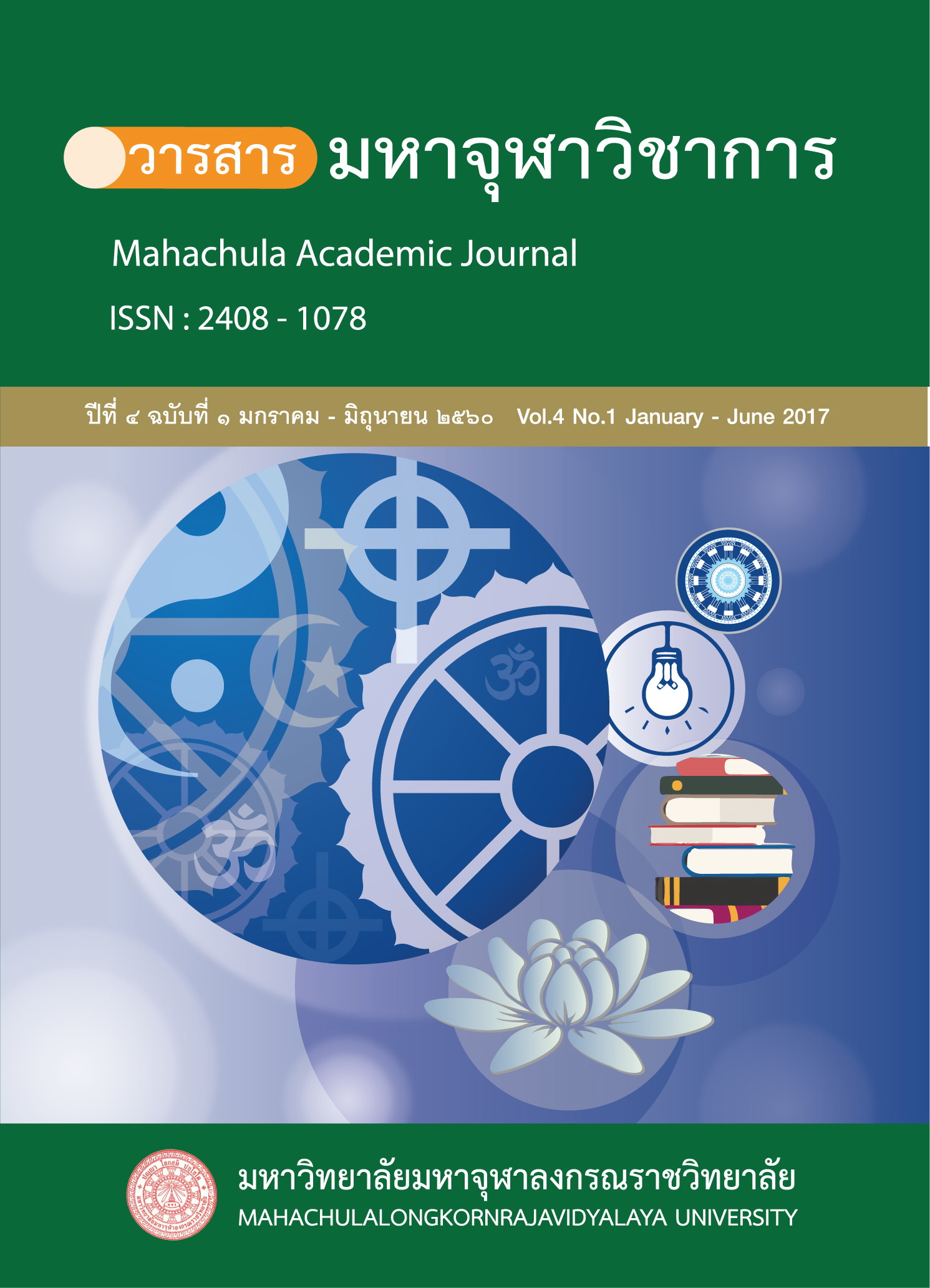Principles of Political Science in Tripitaka: Democracy
Main Article Content
Abstract
Political Science is a branch of Social Sciences that focuses on political behavior of a human being in the society. No principles can be proved that which method is the best administration. However, it is accepted that democracy is the best administration because the word “democracy”, defined as “the rule of the people”, is a system dominantly governed by people who have freedom and equal rights. It is a government by law or the rules of law that protect basic rights of people both in terms of rights and liberties in the property, expressions and living, etc. Democracy is based on the principle of the majority of votes in conjunction with the respect the rights of the minority. The democratic principle was found in Tripitaka, particularly in many parts of Vinaya Pitaka and Sutta Pitaka. The first chapter of a real democracy is Ovadha Patimokkha.
It is the heart of Buddhism because it contains three principles of Dhamma: Three principle, three Ideologies, and six methods. Besides, democracy consisted of three principles of supremacy including autocracy, supremacy of the world and supremacy of the Dharma. Moreover, the democratic principles are also bestowed by Buddha to the Sangha for performing religious activities, particularly in ceremonies performed by a chapter of Buddhist monks assembled in solemn conclave. In this process, discipline is the constitution or law that goes in line with equity or discipline. In addition, the middle path and democracy must be followed by giving the majority decision to the Sangha.
Article Details
References
จิรโชค (บรรพต) วีระสัย และคณะ. รัฐศาสตร์ทั่วไป. กรุงเทพมหานคร : โรงพิมพ์มหาวิทยาลัยรามคำแหง, ๒๕๓๘.
จรูญ สุภาพ. หลักรัฐศาสตร์ฉบับพื้นฐาน. กรุงเทพมหานคร: ไทยวัฒนาพานิช. ๒๕๒๗.
อุทัย หิรัญโต. สารานุกรมศัพท์ทางสังคมวิทยามานุษยวิทยา. กรุงเทพมหานคร: โอเดียนสโตร์. ๒๕๒๖.
เดชชาติ วงศ์โกมลเชษฐ์. หลักรัฐศาสตร์ พิมพ์ครั้งที่ ๗. พระนคร: โรงพิมพ์สมาคมสังคมศาสตร์, ๒๕๑๕.
ประมูล สารพันธ์, ดร. ความรู้เบื้องต้นเกี่ยวกับพระไตรปิฎก (บทความ). กรุงเทพมหานคร: มหาวิทยาลัยมหาจุฬาลงกรณราชวิทยาลัย. ๒๕๕๐.
ประยงค์ สุวรรณบุบผา. รัฐปรัชญา แนวคิดตะวันออก-ตะวันตก. กรุงเทพมหานคร: สำนักพิมพ์โอเดียนสโตร์, ๒๕๔๑.
พระธรรมปิฎก (ป.อ. ปยุตฺโต). พจนานุกรมพุทธศาสตร์ ฉบับประมวลธรรม. กรุงเทพมหานคร: โรงพิมพ์มหาจุฬาลงกรณราชวิทยาลัย. ๒๕๔๖.
มหาวิทยาลัยมหาจุฬาลงกรณราชวิทยาลัย. พระไตรปิฎกภาษาไทย ฉบับมหาจุฬาลงกรณราชวิทยาลัย, กรุงเทพมหานคร: โรงพิมพ์มหาจุฬาลงกรณราชวิทยาลัย, ๒๕๔๒.
สุพจน์ บุญวิเศษ. หลักรัฐศาสตร์. กรุงเทพมหานคร: ห้างหุ้นส่วนจำกัด เอ็ม. ที.เพรส, ๒๕๔๙.
เสฐียรพงษ์ วรรณปก. คำบรรยายพระไตรปิฎก, กรุงเทพมหานคร: ธรรมสภา, ๒๕๔๓.
อมร รักษาสัตย์ และคนอื่นๆ. ประชาธิปไตย:อุดมการณ์ หลักการและแบบอย่างการ ปกครองหลายประเทศ. กรุงเทพมหานคร: สำนักพิมพ์แห่งจุฬาลงกรณ์มหาวิทยาลัย. ๒๕๔๓.
อมร โสภณวิเชษฐ์วงศ์ และ กวี อัศวรวรรณ. พระพุทธศาสนา. กรุงเทพมหานคร: สำนักพิมพ์วัฒนาพานิช, ๒๕๓๔.
อานนท์ อาภาภิรม. รัฐศาสตร์เบื้องต้น. กรุงเทพมหานคร: สำนักพิมพ์โอเดียนสโตร์, ๒๕๔๓.
เว็บไซต์
วิกิพีเดีย สารานุกรมเสรี http://th.wikipedia.org/wiki/โอวาทปาติโมกข์


